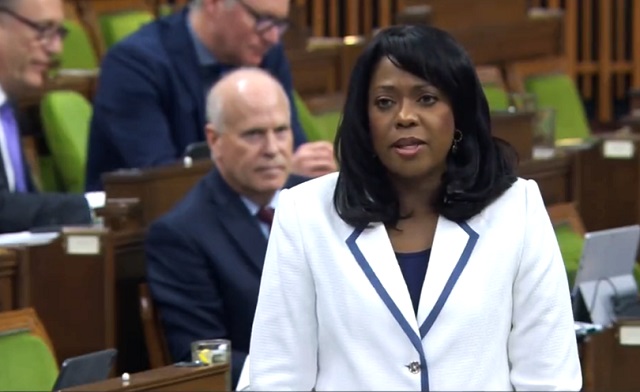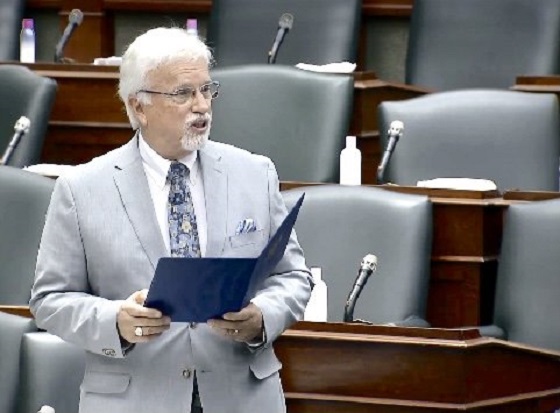Great Reset
Leslyn Lewis warns WHO pandemic treaty amendments violate Canadian sovereignty

From LifeSiteNews
The WHO amendments were adopted despite thousands of Canadians appealing for their rejection.
Conservative MP Leslyn Lewis has blasted that the World Health Organization’s (WHO) new International Health Regulations (IHR), warning they will compromise Canada’s sovereignty.
On December 19, Dr. Leslyn Lewis, Conservative Member of Parliament (MP) for Haldimand-Norfolk, Ontario, condemned Health Minister Mark Holland for failing to protect Canada’s sovereignty by consenting to pandemic amendments put forward by the WHO, which give the international organization increased power over Canadians.
“Canada consented to the amendments to the WHO’s International Health Regulations (IHR), which limits Canada’s time to respond to further amendments, despite thousands of Canadians signing a petition expressing their concerns,” Lewis wrote on X, formerly known as Twitter.
Canada consented to the amendments to the WHO’s International Health Regulations (IHR), which limits Canada’s time to respond to further amendments, despite thousands of Canadians signing a petition expressing their concerns.
See my letter below outlining why the response to… pic.twitter.com/1AZ63ebHX3
— Dr. Leslyn Lewis (@LeslynLewis) December 19, 2023
In October, Lewis endorsed a petition demanding the Liberal government under the leadership of Prime Minister Justin Trudeau “urgently” withdraw from the United Nations and its subgroup, the World Health Organization (WHO), due to the organizations’ undermining of national “sovereignty” and the “personal autonomy” of citizens.
The petition was signed by nearly 19,000 Canadians despite only being open for 30 days. It warned that the “secretly negotiated” amendments could “impose unacceptable, intrusive universal surveillance, violating the rights and freedoms guaranteed in the Canadian Bill of Rights and the Charter of Rights and Freedoms.”
However, despite Canadians’ concerns, the Trudeau government adopted the amendments proposed by the WHO. The new amendments reduce the time for “rejecting any future amendments to the IHR (2005) from 18 months to 10 months” and “implementing future changes into Canadian domestic law from 24 months to 12 months.”
According to Lewis, the amendments alter the original treaty by failing to provide sufficient time for Canadians to consider changes to the agreement before they are scheduled to take effect.
Lewis further explained that the amendments were first presented at the 75th World Health Assembly in 2022 in violation of the IHR law which states, “The text of any proposed amendment shall be communicated to all States Parties by the Director-General at least four (4) months before the Health Assembly at which it is proposed for consideration. ”
“Such amendments were illegitimately submitted and must therefore be regarded as null and void,” Lewis argued. “The question is, why were they not regarded as null and void by Canada?”
Lewis pointed out that the 10-month period “would not allow sufficient time for Canada to study and closely examine the 300+ amendments currently being considered by the IHR.”
“This period will be far too short to determine the scale of impacts of these proposed amendments on our domestic laws and the Canadian people,” she added.
“This period will also be far too short to have these amendments go through the parliamentary process and to conduct the necessary public consultations on changes that constitute binding rules on Canada’s response to health emergencies,” Lewis warned.
U.N.’s Agenda 2030 and the WEF’s ‘Great Reset’
The Trudeau government’s rejection of Canadians’ concerns and acceptance of the amendments should not come as a surprise considering Trudeau’s environmental goals which are in lockstep with the United Nations’ “2030 Agenda for Sustainable Development.”
Agenda 2030 was adopted by the U.N. General Assembly in 2015. Through its 17 Sustainable Development Goals (SDGs), it seeks to “transform our world for the better,” by “taking urgent action on climate change,” as well as “support[ing] the research and development of vaccines and medicines.” Some of the 17 goals also seek to expand “reproductive” services, including contraception and abortion, across the world in the name of women’s rights.
According to the U.N., “all” nations working on the program “will implement this plan.”
Part of the plan includes phasing out coal-fired power plants, reducing fertilizer usage, and curbing natural gas use over the coming decades. Canada is one of the world’s largest oil and gas producers; however, Trudeau has made it one of his goals to decimate the industry.
Critics have sounded the alarm over the Trudeau government’s involvement in the WEF and other globalist groups, pointing to the socialist, totalitarian nature of the “Great Reset” agenda and its potential to usher in a Communist China-style social credit system.
In a blow to the globalist U.N. agenda, however, Canada’s oil and gas sector recently scored a huge win after the Supreme Court of Canada declared Trudeau’s government’s Impact Assessment Act, dubbed the “no-more pipelines” bill, is mostly “unconstitutional.”
As for Lewis, she is pro-life and has consistently called out the Trudeau government for pushing a globalist, anti-life agenda on Canadians.
Early last year, Lewis noted that the WEF is “not our government” and that Canadians did not “sign up” to be attached to one of its charters. Lewis herself helped expose Canadians to the fact that Trudeau’s Liberal government signed onto the WEF charter in 2020.
Great Reset
Middle school girls who refused to compete against male banned from next track meet

From LifeSiteNews
Four of the five girls filed a lawsuit against the Harrison County Board of Education protesting the ban while Attorney General Patrick Morrisey said, ‘I will do everything in my power to defend these brave young girls. ‘This is just wrong.’
Five West Virginia female middle school athletes who refused to throw the shot put against a boy after a circuit court exempted him from a state law that prevents males from competing on female sports’ teams have been banned from participating in their next competition.
On April 18, the five girls attended the 2024 Harrison County Middle School Championships track and field meet where they were scheduled to compete in shot put.
The five students stepped out of the shot-put circle without throwing, forfeiting in protest of the participation of an eighth-grade male student presenting himself as a girl during the competition.
After four of the five girls filed a lawsuit against the Harrison County Board of Education protesting the ban, West Virginia Attorney General Patrick Morrisey stepped in and wrote an amicus brief on their behalf.
“I will do everything in my power to defend these brave young girls,” Morrisey wrote Monday on X. “This is just wrong. We must stand for what’s right and oppose these radical trans policies.”
“The only thing this decision does is teach these children to keep their mouths shut and not disagree with what they saw as unfairness,” said Morrisey, according to a statement from his office. “That is outrageous and it tramples these students’ rights to freedom of speech and expression.”
“Their actions at the earlier track meet were not disruptive or aggrandizing. They were the quiet demonstration of the student-athletes’ evident unhappiness with the competitive consequences of a federal appellate court’s decision,” said Morrisey, a Republican candidate for governor.
“Rather than being punished for their conduct or being sidelined in an effort to score points, all should commend these young athletes for putting their personal performances aside to demonstrate their discontent with an unjust result that affects them personally and within that event,” he said.
Other conservatives took to X to express support for the banned girls.
“How many young girls are losing opportunities because cowardly liberal and RINO politicians are caving to mental illness?” the Travis Media Group asked.
JUST IN: The 5 girls from Lincoln Middle School in West Virginia who protested a trans student participating in shot put by refusing to participate, have been banned from school sports.
Harrison County Board of Education made the decision, and now they’re being sued by the… pic.twitter.com/t6dannzqhg
— 🇺🇸Travis Media Group🇺🇸 (@TM1Politics) April 30, 2024
“Girls banned from girls’ sports instead of a male being banned from girls’ sports,” wrote Greg Scott, vice president of policy for the Center for Arizona Policy’s, noting, “and this isn’t California or New York. This is Wild and Abominable West Virginia.”
Girls banned from girls' sports instead of a male being banned from girls' sports.
And this isn't California or New York.
This is Wild and Abominable West Virginia. https://t.co/oTB0xwovh7
— Greg Scott (@GScottSays) April 30, 2024
“You can’t participate in this meet until you admit girls don’t exist,” said the Redheaded Libertarian, “unless you want abortions, because it’s your rights as girls.”
NEW: Five middle schoolers who refused to compete against a biological male in the shot put have been banned from future competitions.
Where are all the outraged feminists?
West Virginia Attorney General Patrick Morrisey is now filing a lawsuit against the Harrison County… pic.twitter.com/CntWcdJMJf
— Collin Rugg (@CollinRugg) April 30, 2024
Business
WEF panelist suggests COVID response accustomed people to the idea of CBDCs

Central Bank of Bahrain governor Khalid Humaidan
From LifeSiteNews
When asked how he would convince people that CBDCs would be a trusted medium of exchange, Bahrain’s central bank governor said that COVID made the digital transformation ‘something of a requirement’ that had ‘very little resistance.’
Central bank digital currencies (CBDCs) will hopefully replace physical cash and become fully digital, a central banker tells the World Economic Forum (WEF).
Speaking at the WEF Special Meeting on Global Collaboration, Growth and Energy Development on Sunday, Central Bank of Bahrain governor Khalid Humaidan told the panel “Open Forum: The Digital Currencies’ Opportunity in the Middle East” that one of the goals of CBDC was to replace cash, at least in Bahrain, and to go “one hundred percent digital.”
Humaidan likened physical cash to being an antiquated “analogue” technology and that CBDC was the digital solution that would hopefully replace cash:
"We're probably going to stop calling it central bank digital currency [CBDC]. It's going to be a digital form of cash, and at some point in time hopefully we will be able to be 100% digital": Central Bank of Bahrain Governor Khalid Humaidan to the WEF https://t.co/Pspr0M1Uuq pic.twitter.com/N5aOkCpzh1
— Tim Hinchliffe (@TimHinchliffe) April 29, 2024
“I thank this panel and this opportunity. It forced me to refine my thoughts and opinions where I’m at a place comfortably now that I’m ready to verbalize what I think about CBDC,” said Humaidan.
If we think cash is the analogue and digital currency is the form of digital – CBDC is the digital form of cash – today, clearly we’re in a hybrid situation; we’re using both.
We know in the past when it comes to cash, central bankers were very much in control with all aspects of cash, and now we’re comfortable to the point where the private sector plays a big role in the printing of the cash, in the distribution of the cash, and with the private sector we use interest rates to manage the supply of cash.
The same thing is likely to happen with CBDC. Yes, the central bank will have a role, but at some point in time – the same way we don’t call it ‘central bank cash’ – we’re probably going to stop calling it central bank digital currency.
“It’s going to be a digital form of the cash, and at some point in time hopefully we will be able to be one hundred percent digital,” he added.
When asked how he would convince people that CBDC would be a trusted medium of exchange, Bahrain’s central bank governor said that people were already used to it and that COVID made the digital transformation “necessary” and “something of a requirement” that had “very little resistance.”
"There's less use of cash […] The transition to fully digital is not going to be a stretch […] People are used to it […] Its adoption rates increased because of COVID […] There is very little resistance": Central Bank of Bahrain Governor Khalid Humaidan to the WEF on CBDC pic.twitter.com/zB7nJAi48G
— Tim Hinchliffe (@TimHinchliffe) April 29, 2024
“Right now, many of our payments are digital. The truth is, I said that we’re in a hybrid model; there’s less and less use of cash,” said Humaidan.
I think from predominantly digital with a little physical, I think the transition to fully digital is not going to be a stretch.
People are used to it, people have engaged in it and certain circumstances did help. Its adoption rates increased because of COVID.
“This is where contactless started to become something of a necessity, something of safety, something of a requirement, and because of that there is very little resistance; trust is already there,” he added.
"Is it [digital euro] going to be as private as cash? No. A digital currency will never be as anonymous and as protecting of privacy in many respects as cash, which is why cash will always be around": Christine Lagarde, BIS Innovation Summit, March 2023 #CBDC pic.twitter.com/BLMVOPax6a
— Tim Hinchliffe (@TimHinchliffe) April 11, 2023
Meanwhile, European Central Bank president Christine Lagarde has been going around the world telling people that the digital euro CBDC would not eliminate cash, and that cash would always be an option.
Speaking at the Bank for International Settlements (BIS) Innovation Summit in March 2023, Lagarde said that a digital currency will never be as anonymous as cash, and for that reason, cash will always be around.
“Is it [digital euro] going to be as private as cash? No,” she said.
A digital currency will never be as anonymous and as protecting of privacy in many respects as cash, which is why cash will always be around.
If people want to use cash in some countries or in some transactions, cash should be available.
“A digital currency is an alternative, is another means of payment and will not provide exactly the same level of privacy and anonymity as cash, but will be pretty close in terms of complete neutrality in relation to the data,” she added.
A WEF Agenda blog post from September, 2017, lists the “gradual obsolescence of paper currency” as being “characteristic of a well-designed CBDC.”
"You could have a potentially […] darker world where the government decides that [CBDC] can be used to purchase some things, but not other things that it deems less desirable like say ammunition, or drugs, or pornography, or something of the sort": Eswar Prasad, WEF #AMNC23 pic.twitter.com/KkWgaEWAR5
— Tim Hinchliffe (@TimHinchliffe) June 28, 2023
Last year at the WEF’s 14th Annual Meeting of the New Champions, aka “Summer Davos,” in Tianjing, China, Cornell University professor Eswar Prasad said that “we are at the cusp of physical currency essentially disappearing,” and that programmable CBDCs could take us to either a better or much darker place.
“If you think about the benefits of digital money, there are huge potential gains,” said Prasad, adding, “It’s not just about digital forms of digital currency; you can have programmability – units of central bank currency with expiry dates.
You could have […] a potentially better – or some people might say a darker world – where the government decides that units of central bank money can be used to purchase some things, but not other things that it deems less desirable like say ammunition, or drugs, or pornography, or something of the sort, and that is very powerful in terms of the use of a CBDC, and I think also extremely dangerous to central banks.
The WEF’s Special Meeting on Global Collaboration, Growth and Energy Development took place from April 27-29 in Riyadh, Saudi Arabia.
“Saudi Arabia’s absolute monarchy restricts almost all political rights and civil liberties,” according to D.C.-based NGO Freedom House.
In the kingdom, “No officials at the national level are elected,” and “the regime relies on pervasive surveillance, the criminalization of dissent, appeals to sectarianism and ethnicity, and public spending supported by oil revenues to maintain power.”
Reprinted with permission from The Sociable.
-

 Alberta1 day ago
Alberta1 day agoAlberta’s vision for passenger rail
-

 COVID-192 days ago
COVID-192 days agoPeckford: Hallelujah! Supreme Court of Canada to hear Newfoundland and Labrador charter case
-

 COVID-192 days ago
COVID-192 days agoFormer Canadian lawmaker has no regrets about refusing COVID shot despite losing his job
-

 Alberta1 day ago
Alberta1 day agoThree Calgary massage parlours linked to human trafficking investigation
-

 Uncategorized1 day ago
Uncategorized1 day agoMaking Alberta a geothermal energy leader
-

 Alberta2 days ago
Alberta2 days agoCanada’s postal service refuses to help with Trudeau’s gun ban buyback program: report
-

 conflict23 hours ago
conflict23 hours agoColumbia on Lockdown After pro-Palestinian Protesters Take Over Building, Hold Janitors Hostage
-

 Canadian Energy Centre22 hours ago
Canadian Energy Centre22 hours agoNorth America LNG project cost competitiveness








